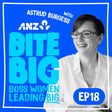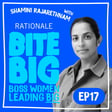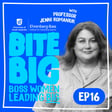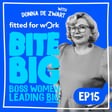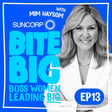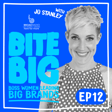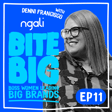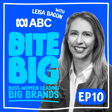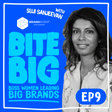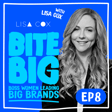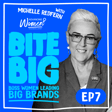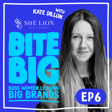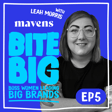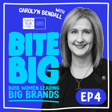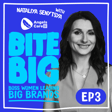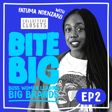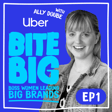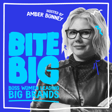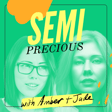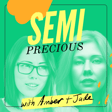
Amber Bites Big with Lucy Bloom - Founder, Creative Director, CEO & Author
In Episode 14, we crank the volume way up. Amber is joined by speaker, author, and rebel leader Lucy Bloom, a woman who doesn’t just challenge the rules of leadership, she rewrites them in hot pink.
From running a top creative agency to leading game-changing charities and launching global firsts like Beer + Bubs (childbirth education for dads at the pub), Lucy’s career is a wild masterclass in passion, resilience and reinvention. With four books under her belt and a speaking career that lights up global stages, she brings truth bombs, belly laughs, and brilliant advice in equal measure.
💥 Boss Takeaways from Episode 14 with Lucy Bloom
- “Do it with passion or not at all.” Lucy’s mantra isn't just catchy, it’s a life philosophy. If it doesn’t light her up, it’s a no. Period.
- Burnout is not a badge of honour. After decades of going full tilt, Lucy’s now all about boundaries, sleep, and putting health first.
- Confidence is a muscle, not a gift. Lucy proves that being bold doesn’t mean being fearless, it means practicing courage over and over again.
- Be so good they can’t ignore you. Whether she’s on stage or running a business, Lucy’s approach to success is simple: back yourself and deliver.
- Purpose makes it worth it.From training midwives in Ethiopia to empowering women in Uganda, Lucy shows that real impact comes when passion meets mission.
- When in doubt, just start. Whether it’s a business, a book, or a sewing project, Lucy’s advice is clear: you don’t need a perfect plan, just the guts to begin.
🔗 Follow BITE BIG for more unfiltered stories from women who lead big one mantra at a time.
Links:
Lucy Bloom LinkedIn
Lucy Bloom Instagram
Lucy Bloom Facebook
Lucy Bloom Website
Lucy Bloom's Books
Lucy Bloom Blog: Why I will never work full time again
The Imperfects: The Science of sleep
Love Mercy Australia
Amber's Instagram
Amber's LinkedIn
The Edison Agency's LinkedIn
The Edison Agency's Instagram
CREDITS
Host & ECD – Amber Bonney, The Edison Agency Founder
Producer – Niki Beeston, Group Account Director, The Edison Agency
Marketing – Liz Archer, Head of Operations, The Edison Agency
Social Assets – Alyssa Payad, Intern, The Edison Agency
Post Production – Francine Toscano, 17th Street Audio
